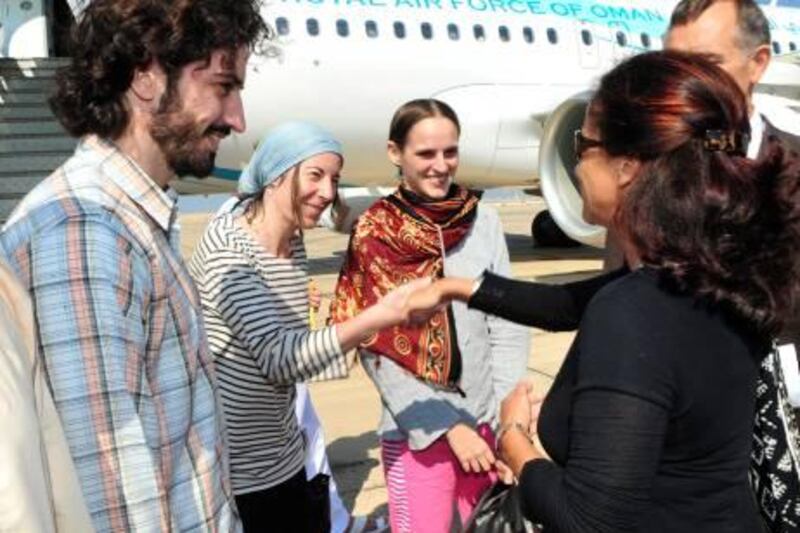SANAA // Three French aid workers held hostage by Al Qaeda militants in Yemen have been freed with the help of the Sultan of Oman after nearly six months in captivity.
The workers left Muscat for France yesterday, just two hours after they arrived.
The two women and one man from Triangle Generation Humanitaire were abducted on May 28 in Hadramawt province, which is home to Al Qaeda in the Arabian Peninsula.
Abdu Al Janadi, Yemen's deputy information minister, said the hostages were held by militants in Shabwa and that the kidnappers threatened to kill them if the Yemeni government did not pay a ransom by the end of the week.
"We know they are in good physical shape," a director of the group, Patrick Verbruggen, told the Associated Press. "We are sharing a moment of happiness."
The aid group, based in Lyon, France, pulled out its expatriate employees from Yemen after the kidnapping, although Yemeni employees remain.
The group works on projects to improve water supplies and farming infrastructure.
Tribal mediators said Sultan Qaboos bin Said asked a friend in Yemen, Ahmed Fareed Bin Suraimah, to intercede on behalf of the hostages.
Mediators said that Mr Bin Suraimah belongs to the Al Awalik tribe, which controls the area where the hostages were held.
"The militants could not put themselves in confrontations with the tribal chiefs of the region and this is why they agreed to release the French hostages," said one of the mediators.
The militants were first demanding the release of a widow of Abu Ayyub Al Masri, a top Al Qaeda operative in Iraq who was killed in 2010, said a mediator who requested anonymity. The widow, a Yemeni, was jailed for life by the Iraqi government for allegedly hiding her husband, who was wanted by Iraqi authorities.
But when it became clear that the widow was not going to be released, the kidnappers demanded money.
Sheikh Ali Abdullah Jubarah, one of the main mediators, said no ransom was paid through him.
The French authorities said the government does not pay ransoms.
An Omani official also insisted that no ransom was paid. "Let me make it very clear that no ransom was paid," a government source in the ministry of foreign affairs said.
But a Yemeni mediator said the Omani government and a Yemeni businessman handed over a ransom, the AP reported. Whether a ransom was paid or not, the French government was pleased. The French president, Nicolas Sarkozy, said that he "warmly thanks the Sultan of Oman and the Oman authorities for their decisive help, as well as all those who contributed to this happy outcome".
Sheikh Jubarah said that after he failed to convince the local authorities to have the hostages turned over to French officials in Shabwa, he smuggled them in his car to Oman.
"I had to smuggle them through the desert one by one. The operation took six days," Sheikh Jubarah said. He first took a woman, then the man, then finally the other woman.
The mediators said negotiations started on Thursday after the Sultan of Oman asked Mr Bin Suraimah to get involved.
Kidnappings are common in Yemen, where tribesmen use abductions to try to force concessions from the government, such as the release of fellow tribesmen in jail.
Sources close to the militants said the hostages spent several weeks in Hadramaut, then were moved to Lwadar city in the province of Abyan. They were later moved to the mountains near Shabwa.
Meanwhile, Yemeni government forces and allied tribesmen killed 10 militants in attacks across the country on Sunday, security officials said. A visiting UN envoy met with the country's president, Ali Abdullah Saleh, to push for a solution to the country's political crisis.
salshaibany@thenational.ae
* With additional reporting by the Associated Press





